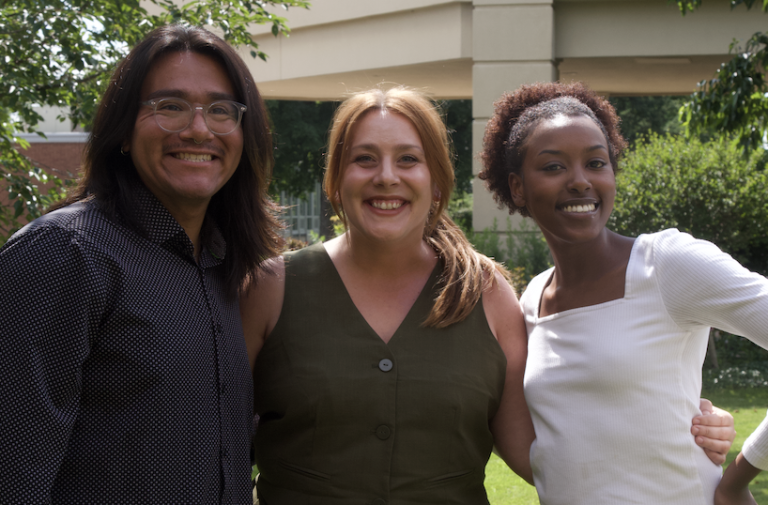“I think a lot more people struggle in college than those who don’t,” said Peace Muhagachi, a senior sociology major.
This summer, Muhagachi worked on a project aimed at addressing these struggles and meeting the needs of students at Goshen College. Also collaborating on the project was Gabe Martinez ‘24 and supervising was Emily Hahn, program director for interpersonal violence prevention, education and advocacy.The project, completed over the course of GC’s eight-week Maple Scholars program, sought to combine outside research and aspects of internal review in order to determine how GC can become a health-promoting campus.
“We know through current research that a significant portion of student success, or the lack thereof,” Hahn said, “is due to nonacademic factors, including mental health, financial stability, basic needs, a sense of belonging, help-seeking behavior, and access to appropriate resources, among others.”
Hahn went on to explain that the nonacademic factors she referenced are commonly referred to as social determinants of health, explained by Muhagachi as “non-medical factors that influence somebody’s health and well-being.” Hahn, Muhagachi and Martinez’s project hypothesized that addressing the SDOH at GC could lead to increased health equity and improved student success and well-being.
In order to begin pursuing their hypothesis, Muhagachi and Martinez spent the first few weeks of their project researching data on student success and reviewing existing programs and policies aimed at addressing SDOH that have been implemented at other colleges nationwide.
“We saw all these programs and policies and we were like, ‘okay, so they’re bringing in more students, they’re having more retention, their students are happier, they feel more supported across the board. So, their students are thriving — why can’t that be here?’” Martinez said.
Martinez and Muhagachi then compared their research with data from GC to determine how well the programs currently implemented here align with national trends.
“We looked at our retention and graduation rates, we looked at our student satisfaction inventories, we looked at data about our Title IX and satisfaction to get a gauge on what students at Goshen College feel is lacking, and what they feel is working for them, and what they think needs more attention,” Muhagachi said.
Through their research, Muhagachi and Martinez found that in comparison to peer institutions, incoming students at GC in 2022-23 had higher rates of frequent depressive and anxious feelings, lower perceived leadership abilities, self-confidence levels and community participation and overall lower rates of feeling prepared for college.
These rates, however, were similar to national data about college students, prompting Muhagachi, Martinez and Hahn to suggest adopting programs and policies similar to those used nationally, as opposed to just those used by peer institutions.
Muhagachi and Martinez used this research and their findings to create recommendations that, if implemented at GC, would hopefully improve rates of student success. These recommendations spanned departments and many aspects of student life.
Some examples included a one-stop model for student support services, the creation of a more formal peer mentoring system, adaptations to existing core requirements for a focus on life skills, new grading procedures, and additional partnerships with community organizations like the Center for Healing and Hope and La Casa. Additionally, they also proposed adopting existing programs from other higher education institutions that have already been proven to be beneficial to student success and well-being.
“We were hoping that with our programs administration and faculty would be more inclined to have a more holistic approach to supporting students here on campus,” Martinez said. “They essentially looked at the student not just as a student, but as a person who has a daily life.”
Martinez and Muhagachi presented their proposal first to the other Maple Scholars and their faculty advisors and a second time afterward to a small group of faculty and administrators.
“We invited all of the presidential cabinet, all of the key stakeholders,” Martinez said of the meeting. “There was very little turnout, so that was a little disappointing.”
In the future though, Muhagachi, Martinez and Hahn all hope to continue to be in conversation with administration, faculty and other stakeholders as the project is further developed.
“We had no illusions that we would complete the project and everyone at GC would be like, ‘Perfect, let’s do every recommendation immediately,’” Hahn said. “Progress takes time, collaboration and relationships.”
Martinez echoed Hahn’s hope for future collaboration and discussion, especially with GC students. “I think there just needs to be a lot more dialogue, a lot more transparency,” he said. “Students will always say, ‘this is what we need, this is what we want,’ but if we’re not able to communicate that in an effective manner, then students will be shut off from administration.”
Muhagachi, a current senior, hopes to continue pursuing the project as she works on her senior thesis. Some of her ambitions include incorporating more of the student voice through focus groups and surveys and focusing the project on a return on investment approach.
Despite the continual work that this project will undergo before it is finished, Muhagachi, Martinez and Hahn all expressed that, even now, they feel it is extremely important, both on a systemic and personal level.
“One of my mantras is leaving a place better than I found it,” Martinez said.




